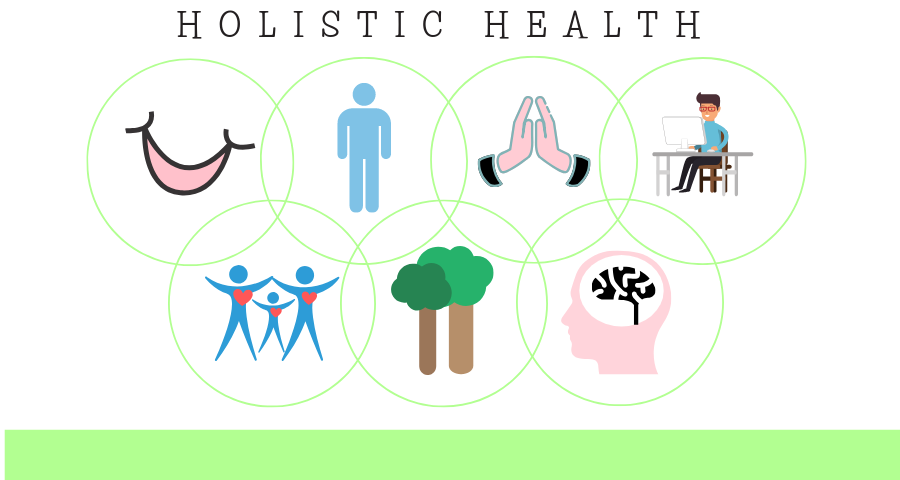Holistic Health is a wellness approach that emphasizes the close connectivity and influence of physical and mental health on our overall well-being. While holism may seem novel, it was in fact coined in 1926 by Jan Christiaan Smuts. Holism, in simple terms, is the idea of ‘balance’. Within Holistic Health are varied forms of treatment. These include acupressure, nutritional counselling, homoeopathy, mindfulness meditation and massage therapy.
Elements of Holistic Health include:
1.Emotional Wellness
It is the awareness of the positive and negative facets of our thoughts, feelings and behaviours. Emotional wellness is about understanding and accepting, while dealing with our emotions constructively. We can achieve emotional wellness by taking an optimistic view of the world which allows us to look to our capabilities in order to achieve change, by learning from our experiences and mistakes and asking for help when we may need it, by living in the moment and practicing positive and motivational self talk.
2.Physical Wellness
Physical wellness includes caring for our body through balanced nutritional diets that include omega-3 fatty acids that strengthen the brain and body, physical activity, as well as, simultaneously paying attention to our mental health. Engaging in physical activity such as structured exercises, sports, or brisk walking for 30 minutes in a day is a must. This keeps our bodies strong and energetic thus reducing the risk of cardiovascular diseases, osteoporosis, obesity and dementia. Sufficient sleep is also an important factor in physical wellness.
3.Spiritual Wellness
Spiritual wellness is about being in tune with our faith, values, ethics and morals. It’s the exploration of meaning and purpose in our lives, allowing us to work towards actualization. Spiritual practices like filling the gratitude journal are believed to accomplish greater sensitivity in the medial prefrontal cortex which enhances learning and decision making. Praying leads to brain activity that has a positive effect on attention, planning skills, the ability to project into the future and construct complex arguments. Spiritual well-being can be accomplished through meditation, yoga, prayer and positive affirmations etc.
4.Occupational Wellness
It’s important to find satisfaction and draw meaning through our work. An average person spends 90,000 hours at work, which is why choosing a fulfilling career and right work atmosphere for yourself, is crucial as it optimizes satisfaction. Stress at work can also be dealt with using time management strategies to manage your workload. Setting professional goals that are SMART(specific, measureable, achievable but challenging, relevant, and time bound), and well planned is important to achieve optimal output.
5.Social Wellness
Social wellness involves building healthy and nurturing relationships with people around us. Such relationships must be built on mutual trust, respect, and an open as well as honest communication coupled with compassion. Such healthy relationships enhances cognition as well as the overall well-being.
6.Environmental Wellness
Being respectful of our personal surroundings and environment is a big part of environmental wellness. Being environmentally aware makes us realise how our habits affect our surroundings, and vice versa; this awareness helps move towards a harmonious lifestyle. The present moment awareness is a form of mindfulness meditation that grounds us in the here and now, and increases activity in the brain regions that are associated with self regulation and emotional regulation. This mind body connect is beneficial to our understanding of ourselves in any environment.
7.Intellectual Wellness
Intellectual wellness is an important aspect of holistic health. Engaging in ongoing learning, developing a new hobby, or doing something creative allows you to seek different perspectives, and stimulates your brain! This cognitive stimulation strengthens the neural connections in the brain, thus safeguarding the brain from extreme effects of aging or injury. The frontoparietal, lateral temporal and parietal cortex-areas involved in attention, memory and semantic processing, are also active during cognitive stimulation; which includes activities like playing board games, intellectual conversations, learning a new language or an instrument.
Holistic Health emphasises the connection between the mind, body, and spirit and encourages taking responsibility for your everyday actions and choices to maximise your overall quality of life. “Nurturing yourself is not selfish – it’s essential to your survival and well-being.” – Renee Perterson Trudeau
Authorship: Divina Tejwani & Shrishti Vaz

